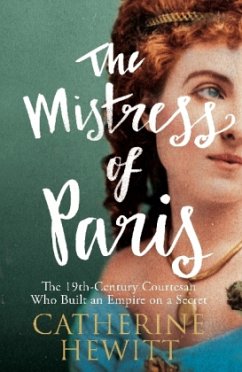Valtesse de la Bigne was a celebrated nineteenth-century Parisian courtesan. She was painted by Manet and inspired Emile Zola, who immortalised her in his scandalous novel Nana. Her rumoured affairs with Napoleon III and the future Edward VII kept gossip columns full.But her glamourous existence hid a dark secret: she was no Comtesse. She was born into abject poverty, raised on a squalid Paris backstreet; the lowest of the low. Yet she transformed herself into an enchantress who possessed a small fortune, three mansions, fabulous carriages, and art the envy of connoisseurs across Europe. A consummate show-woman, she ensured that her life - and even her death - remained shrouded in just enough mystery to keep her audience hungry for more.Catherine Hewitt's biography tells, for the first time ever in English, the forgotten story of a remarkable woman who, though her roots were lowly, never stopped aiming high.
Bitte wählen Sie Ihr Anliegen aus.
Rechnungen
Retourenschein anfordern
Bestellstatus
Storno








